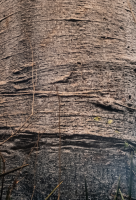 António Ole: Vital Matter gathers works from different periods of António Ole's (Luanda, 1951) multifaceted artistic journey of over fifty years. Made in various media, from sculpture to photography, from drawing to video, these works highlight the attention that Ole has devoted to nature and its vital elements and materials. The earth, water, fire and air here take on countless forms that, as a whole, invite a planetary perception and an ecological awareness not only of the cohabitation, but, above all, of the interdependence between human and non-human forms of life (animal, vegetable, mineral) – vital matter to whose urgency the pandemic itself has, more than ever, alerted us.
António Ole: Vital Matter gathers works from different periods of António Ole's (Luanda, 1951) multifaceted artistic journey of over fifty years. Made in various media, from sculpture to photography, from drawing to video, these works highlight the attention that Ole has devoted to nature and its vital elements and materials. The earth, water, fire and air here take on countless forms that, as a whole, invite a planetary perception and an ecological awareness not only of the cohabitation, but, above all, of the interdependence between human and non-human forms of life (animal, vegetable, mineral) – vital matter to whose urgency the pandemic itself has, more than ever, alerted us.
I'll visit
27.04.2021 | by Ana Balona de Oliveira